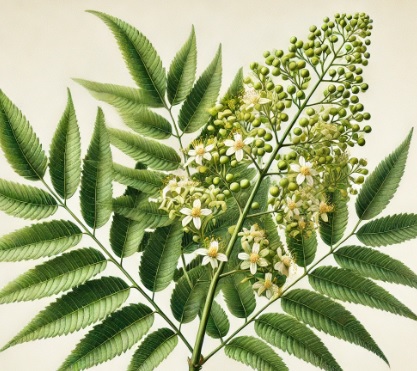The Meliaceae family, also known as the mahogany family, is a botanical group belonging to the order Sapindales. This family consists of about 50 genera and around 600 species, primarily distributed in tropical and subtropical regions. The Meliaceae include trees, shrubs, and woody vines that are ecologically, economically, and commercially significant.

General Description
The Meliaceae family is characterized by large, often evergreen trees with pinnate leaves and small, fragrant flowers. The flowers are typically arranged in panicles or racemes, while the fruit is usually a capsule or drupe. The family includes some of the most well-known tropical hardwood trees, such as Swietenia (mahogany), valued for its durability and beauty.
Chemical Composition
Plants in the Meliaceae family are known to contain a variety of bioactive compounds, particularly limonoids, a class of chemicals with insecticidal, fungicidal, and antimicrobial properties. Some genera, such as Azadirachta (neem), contain compounds like azadirachtin, which are widely used in natural pest control. Other compounds found in Meliaceae plants include alkaloids, flavonoids, tannins, and terpenoids, which contribute to their medicinal properties.
Physical Properties
Meliaceae species typically have a woody structure, often dense and strong, with leaves that are usually pinnate or bipinnate. The flowers are small but fragrant, and the fruit is often a hard capsule containing multiple seeds. The wood of Meliaceae trees, such as mahogany, is highly valued for its strength, color, and workability, making it a popular choice in furniture making, construction, and fine carpentry.
Production Process
The Meliaceae family is primarily cultivated for its wood, which is harvested from species like Swietenia mahagoni (genuine mahogany) and Khaya ivorensis (African mahogany). These trees are grown mainly in tropical and subtropical climates, and their wood is harvested sustainably to minimize environmental impact. The extraction of bioactive compounds from Azadirachta indica (neem), especially azadirachtin, involves the careful collection of leaves, bark, and seeds, followed by extraction using solvents or mechanical methods.
Applications
Medical
Meliaceae plants are known for their medicinal properties, particularly those from the genus Azadirachta. Neem (Azadirachta indica) has been used in traditional medicine for centuries due to its antibacterial, antifungal, and antiviral properties. Neem oil is commonly used to treat skin conditions such as eczema, acne, and dandruff. Limonoids and other compounds found in Meliaceae species are also being researched for their potential in cancer treatment and pest control.
Cosmetics
Neem oil and extracts from various Meliaceae species are used in cosmetics for their anti-inflammatory, antimicrobial, and moisturizing properties. Products containing neem oil are popular for treating scalp conditions, acne, and skin irritations. The antimicrobial properties also make neem oil a common ingredient in toothpaste and mouthwashes.
Agriculture
Meliaceae plants, particularly Azadirachta indica, are highly valued in organic farming for their natural insecticidal properties. The compound azadirachtin is widely used in natural pest control products, effectively repelling or killing harmful insects like aphids, termites, and caterpillars, without harming beneficial insects such as bees and ladybugs.
Wood and Timber
The wood of Meliaceae trees, particularly Swietenia mahagoni and Khaya ivorensis, is highly sought after in the timber industry. Mahogany wood is prized for its durability, attractive color, and ease of workability, making it a popular choice for furniture, cabinetry, flooring, and fine woodworking. Its resistance to decay also makes it valuable in construction and boat building.
Environmental and Safety Considerations
The harvesting of mahogany and other Meliaceae species must be managed sustainably to prevent over-exploitation and deforestation. Many species are now subject to strict regulations and conservation efforts to protect endangered populations. Regarding safety, compounds extracted from Azadirachta indica, such as neem oil, are generally considered safe for topical use, though allergic reactions may occur in some individuals. It is important to use these products in accordance with recommended guidelines to avoid adverse effects.
INCI Functions
- Antimicrobial: Prevents or inhibits the growth of microorganisms.
- Antioxidant: Protects cells from oxidative stress.
- Anti-inflammatory: Reduces inflammation in skin and mucosal tissues.
- Insecticidal: Repels or kills pests.
In conclusion, the Meliaceae family is a botanically and economically significant group, with diverse applications in medicine, agriculture, and industry. Sustainable use of Meliaceae plants, particularly for their wood and bioactive compounds, is crucial for ensuring their continued availability and for protecting the ecosystems in which they thrive.
![]() Meliaceae
Meliaceae 

